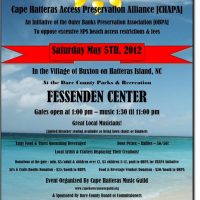A house subcommittee today heard testimony on H.R. 4094, a bill introduced by U.S. Rep. Walter Jones, R-N.C., to overturn the final off-road vehicle plan, end a court-agreed-to consent decree, and return management at the Cape Hatteras National Seashore to the 2007 Interim Protected Species Management Plan. The bill would ?authorize pedestrian and motorized vehicular […]
Editor’s Blog | Full Article
And, finally, to the maximum extent possible, the secretary must designate pedestrian and vehicle corridors of minimal distance around any additional restricted areas to allow access to areas that are not closed. In December 2005, the NPS began the negotiation process to create regulations that would allow the seashore to meet its compliance standards, and in June 2007, an Interim Management Strategy was implemented to provide a framework for regulating the seashore while the NPS developed its long-term plan. This Interim Management Strategy allowed for controlled ORV access to the beaches. However, on July 17, 2007, an injunction was filed by the Defenders of Wildlife and the National Audubon Society to prevent ORV use until a final management plan was established and approved by NPS. A settlement negotiation process ensued, and on April 30, 2008, a federal judge approved a consent decree that required all seashore ramps to be closed to ORVs from 10 p.m. until 6 a.m., created buffers for nests and chicks that are clearly defined and in some cases more restrictive, and ruled that deliberate violations of the buffers would result in an expanded restricted area. In February 2012, the NPS implemented final rules, requiring that ORVs must obtain permits to access the seashore, further limiting the accessibility of the park to vehicles. FOR MORE INFORMATION Click here to read the Senate bill, The Preserving Public Access to the Cape Hatteras Beaches Act. The Interim Protected Species Management Strategy is available on the park planning website at http://parkplanning.nps.gov/document.cfm?parkID=358&projectID=13331&documentID=19796
April 26, 2012 | Local News | By: Irene Nolan

Burr and Hagan introduce bill in Senate to overturn final ORV plan By IRENE NOLAN By IRENE NOLAN By IRENE NOLAN U.S. Sens. Richard Burr, R.-N.C., and Kay Hagan, D-N.C., today introduced in the Senate the Preserving Public Access to Cape Hatteras Beaches Act, a bill that would overturn the National Park Service’s final off-road […]
Local News | Full Article
Cape Hatteras Music Festival to benefit CHAPA is May 5
April 25, 2012 | Local News | By: Irene Nolan

“Beach music” will take on a new meaning on Saturday, May 5, when some 40 Outer Banks musicians will be playing all afternoon and into the night to raise money to restore more reasonable public access to the beaches of the Cape Hatteras National Seashore. The First Annual Cape Hatteras Music Festival is being organized […]
Local News | Full Article
Subcommittee hearing on Jones bill is Friday, April 27 By IRENE NOLAN
April 25, 2012 | Local News | By: Irene Nolan
UPDATE: April 26, 2012 HOUSE LEGISLATIVE HEARING ON: H. R. 4094 (W. Jones), To authorize pedestrian and motorized vehicular access in Cape Hatteras National Seashore Recreational Area, and for other purposes. “Preserving Access to Cape Hatteras National Seashore Recreational Area Act” AND OVERSIGHT HEARING ON: “Access Denied: Turning Away Visitors to National Parks” WITNESSES AND […]
Local News | Full Article
The U.S. government responded yesterday to a lawsuit filed in February by the Cape Hatteras Access Preservation Alliance that seeks to overturn the National Park Service’s new off-road management plan and final rule. The complaint, filed Feb. 9 in U.S. District Court for the District of Columbia, names as defendants Ken Salazar, Secretary of the Department of the Interior, Jonathan Jarvis, director of the National Park Service, and Mike Murray, superintendent of the Cape Hatteras National Seashore. The complaint asks the court to determine that the Park Service acted improperly and to prevent NPS from implementing its final plan and rule, which became effective Feb. 15. CHAPA is a project of the Outer Banks Preservation Association, a group dedicated to preserving and protecting the historical use of the beach on the Outer Banks and specifically the Cape Hatteras National Seashore. In its complaint, CHAPA takes issue with just about every step in the process of ORV rulemaking, “An ORV management plan and a final rule that imposes severe restriction on ORV use at CHNSRA were foreordained from the time that NPS began its planning process,” the complaint says. Attorneys for the federal government responded with an affirmative defense – that CHAPA failed to make claims upon which relief can be granted. “To the extent that a response is required, Federal Defendants deny that Plaintiff is entitled to the relief requested or any relief whatsoever.” An affirmative defense is defined as “a defense in which the defendant introduces evidence, which, if found to be credible, will negate criminal or civil liability, even if it is proven that the defendant committed the alleged acts.” As one local attorney explained, the federal agencies are claiming that “there was no violation of the law, even if everything plaintiffs stated in the lawsuit is true.” The response asks the court to deny all relief sought by CHAPA in the complaint and to grant judgment to federal defendants. The 27-page response is filled with denials. It admits certain allegations — that the seashore was operating without a plan as required by several Presidential orders, that NPS began the process of developing a plan in 2005, that in March, 2010, the park published a draft plan and environmental impact statement – but denies just about everything else but the facts. The response’s affirmative defense says that even if the Park Service didn’t do it right, that CHAPA is not entitled to relief since NPS followed the rules and regulations. CHAPA spokesman David Scarborough said that “Our attorneys were not surprised” by the response. The case has been assigned to U.S. District Court Judge Emmet G. Sullivan. He issued an order today that counsel for all parties confer no later than May 24 and submit their report addressing all required topics no later than May 31. Sullivan directed counsel to include in their report a brief statement of the case and the statutory basis for all causes of action and defenses. The judge last month permitted Defenders of Wildlife, the National Audubon Society, and the National Parks Conservations Association, represented by the Southern Environmental Law Center, to join the case as defendant-intervenors on the side of the federal agencies. FOR MORE INFORMATION Click here to read the U.S. government response to the CHAPA lawsuit. Click here to read the judge’s order for counsel to meet and confer.
April 24, 2012 | Seashore News | By: Irene Nolan
UPDATE: Federal government responds to CHAPA lawsuit By IRENE NOLAN By IRENE NOLAN By IRENE NOLAN The U.S. government responded yesterday to a lawsuit filed in February by the Cape Hatteras Access Preservation Alliance that seeks to overturn the National Park Service’s new off-road management plan and final rule. The complaint, filed Feb. 9 in […]
Seashore News | Full Article
Beach (access) music
April 20, 2012 | Editor's Blog | By: Irene Nolan
?Beach music? will take on a new meaning on Saturday, May 5, when some 40 Outer Banks musicians will be playing all afternoon and into the night to raise money to restore more reasonable public access to the beaches of the Cape Hatteras National Seashore. The First Annual Cape Hatteras Music Festival is being […]
Editor’s Blog | Full Article
A bill hearing, ferry taxes, signs, and lawsuits
April 13, 2012 | Editor's Blog | By: Irene Nolan
This is the week that Cape Point closed ?temporarily? to off-road vehicle and pedestrian access because a pair of piping plovers is courting in an area of the beach between Ramp 44 and the Point.The Park Service?s ORV plan requires a mandatory buffer of 75 meters around the birds, which has cut off access.There have […]
Editor’s Blog | Full Article
The rules of engagement
April 5, 2012 | Editor's Blog | By: Irene Nolan
Most of my last blogs on the issue of beach access have been frustrating ? to me and to some of The Island Free Press readers. ?I don’t read Irene’s Blog to learn about the island’s important issues,? one reader said in a comment posted today. I skim over the comments to laugh at the […]
Editor’s Blog | Full Article
A different look at the costs and benefits of seashore management policies
March 30, 2012 | Editor's Blog | By: Irene Nolan
Ever since Defenders of Wildlife, the National Audubon Society, and the Southern Environmental Law Center took aim on the National Park Service for not have an off-road vehicle management plan, the groups have managed to get their message out masterfully. You?ve got to admire these folks. They?re well funded, and it shows. Their public information […]
Editor’s Blog | Full Article
Walking in the water
March 23, 2012 | Editor's Blog | By: Irene Nolan
Some of the Park Service?s new signage on the seashore has caused quite a stir this week with coverage in print, online, and broadcast media and plenty of discussion in the social media and blogs. The signs have been erected recently to inform the public about the new rules under the Park Service?s off-road vehicle […]
Editor’s Blog | Full Article



